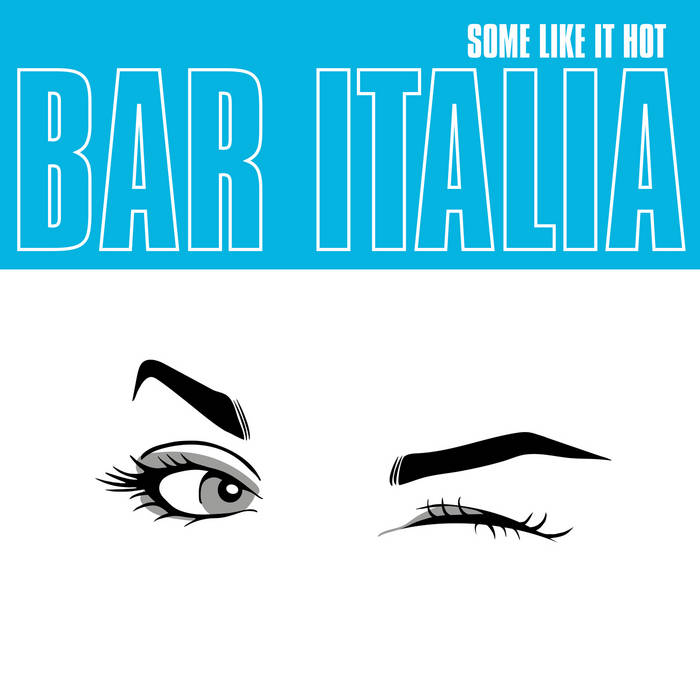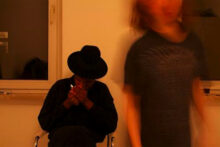London-rooted but breathlessly international, the rapidly emerging diffident art-pop trio Bar Italia arrive at their fifth album in five years, and third for Matador. In March 2026 they’ll headline by far their biggest hometown show to date, at The Roundhouse. Some Like It Hot is clearly the point at which this cult outfit punts for the big-time.
A wrinkle in that potted biog is the band’s knotty relationship with the international art and fashion trades – scenesters to the core – associations which have brought them early spotlights and made them trendy in those circles, to an extent side-stepping conventional music promotional routes. It’s not that they don’t tour or anything. But they do combine their music with art exhibitions, often in storied spaces. Music is just one piece of the puzzle.
Named for the café in Soho, Bar Italia are a trio of singer-guitarists, giving this the odour of a collated project, rather than a true-born band. Nina Cristante, Sam Fenton and Jezmi Tarik Fehmi met when they were neighbours in Peckham. Three front people, one pandemic-born outfit. Cristante already worked internationally as a visual artist and wandering muse, in a relationship (and sometimes experimental duo) with slippery London art-scene provocateur Dean Blunt, who signed Bar Italia to his indie label World Music for their first two records.
Now they’re safely on a big label, joining Matador in 2023 and releasing two excellently titled albums in that one year, Tracey Denim and The Twits. So it’s album five already, yet this still feels like that early career headrush towards success.
Single ‘Fundraiser’ opens the record. It’s a processed-sounding bop, reasonably energetic, coming off early doors like late-Britpop b-roll. I suddenly remember The Supernaturals. Or, more positively, I’m reminded of the American early 2000s band Hot Hot Heat and their breakthrough hit ‘Bandages’, though that was a more memorable song. Lead vocals swap between masc and femme, but these have been treated differently in production, so they don’t cohere like they’re in one space. The result is often that Cristante sounds plonked on top, out of a different session.
‘Marble Arch’ has a similar sound over a swung 60s-ish beat. This time the voices come together for the chorus in a more conventional duet format and that works okay. Perhaps there’s something of St Etienne in here – in studied coolness, at least – though that great trio’s ideas and palettes were far more varied and deeply excavated.
Coming to it cold, and despite its strutting self-confidence, I’m surprised this music is not more complex or, well, interesting. Partly it’s the affected, glottal singing. A young Damon Albarn, or at points almost Kevin Rowland-levels of glot and glug. Entitled voice disguised as regular voice, maybe, hiding the inner posho?
Next, a slightly ‘Golden Brown’-ish soporific waltz, ‘Bad Reputation’. I’m ashamed to say my opinion is already hardening like drying concrete, far too soon in the record. I’ll keep ploughing on but this is absolute dogger. Three songs in without a discernible hook, or an imaginative idea. It’s just rehashed vibes and efficiently constructed sound.
Thank god, ‘Cowbella’ is a bit more fun, in sound and chuggy groove at least. Still, the songwriting is way off – random declamatory chunks jammed together. It drives along and has an immediacy on the edge of distorting that slaps a bit on impact. But it’s only the production techniques that are distinguishing verses from choruses. And it has the shittest guitar solo of 2025 so far, any genre.
Clearly, Bar Italia are reaching for sound and pose first. This is a record intended, whenever possible, to serve arch hipness, as backdrop to whatever visual ideas they throw around the project, with anything like raw content subjugated. With pastiche fingerpicked nylon guitar and brushes, ‘Plastered’ aims for languorous. Sometimes, particularly on slower material, Cristante has a slightly drawled Nico-like flatness, not actually off-key but lazy, obviously without Nico’s character or fragility.
The closing title track also has some of that 1960s louche groove. And for me, the album’s best moments are those hints of retro poking through, nodding backwards in time.
If the lyrics were poetry, the sheer basic-ness of it all might be fine. But throughout Some Like It Hot the words come across as angular, oblique non-sentences, occasionally clever or wry, but mostly daft and clichéd wrangles of syllable and vagueness of basic sentiment, the most simplistic connection or meaning, often without even internal coherence over the length of a song.
There’s a distracted short-attention-span looseness going on that feels artificial and I hope it is, because otherwise it’s just thick. Shallowness worn proudly. Where some lines technically work, overall it gets so disjointed and almost comedically dumb-arse, it becomes less than the sum of its parts. The blokey spoken bit in ‘I Make My Own Dust’ is John Barnes-level execrable. Over the course of this record, Bar Italia’s wordplay makes The Last Dinner Party sound like Leonard Cohen. For me, this lack of content sinks this record, however stylishly it’s dressed up.
Root and branch, from dour descending chords, to trite sentiment, to half-arsed writing, to another plain awful guitar solo, ‘Rooster’ may be my least favourite thing I’ve heard professionally produced and commercially released in two or three years. And it was a single.
People have every right to make empty-headed indie pop, just for kicks or to prance about feeling sexy to. Fair play to that. There’s a ton of smart marketing and style mag gusto here. If she wasn’t making music at all, Cristante would probably still have Face magazine features dedicated to her.
Bar Italia have piles of affected artsy swag and if you just need a lively record playing in the background at a White Cube private view, it’s surely fine. It’s all great hair, liquidity of imagery and such. Like, doing no interviews until the exact moment when people wanted interviews, then doing some. Cynical side-eye everywhere. A fashion industry executive’s idea of what a band is, perfume-video-ready.
Everything about Bar Italia seems more like a fictional band in a television drama, built from the hottest people in the extras pool. I imagine them playing in the background at a coke-addled office party in season three of Industry, or that Lena Dunham London-set rom com, Too Much.
What Bar Italia – the café in Soho – is known for, really, is being there a long time, and serving not very good food. In the end, Bar Italia – the band – is a London art scene iteration of the current pop stardom blueprint, whereby the music itself is just one facet of the artist’s public-facing iconography. The songs don’t need to be real. In that context, the music is merely a tool, on the road to somewhere else.
But here, it flags a key problem with marketed mystique: at some point, your audacity needs to be in the service of something tangible. You can get away with it for a while, especially at the beginning. But in the end, you must deliver something. Greater and edgier artists than Bar Italia have fallen foul of that requirement.
I am reminded of that packaging material sometimes used nowadays instead of bubble wrap. It’s made from corn starch, feels like sturdy pieces of foam, until you get it wet, when it just evaporates away into nothing. If you told me this whole project was one of those A.I. art prank experiments, with the humans merely contributing the physicality and the barest, most functional tweaks, I’d believe you. I’d be relieved.



